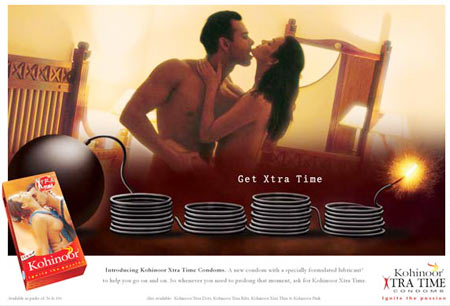Photographs: Courtesy DKT International Courtesy LoveMatters.info
Birth control should be broached as being sexually pleasurable for young couples, who are more intimidated by the clinical aspect of it.
Making birth control sexy works better than using scare tactics, says family planning organisation DKT International.
DKT uses social marketing to provide cheap contraceptives and safe abortions, and help prevent HIV/AIDS. Doesn't this encourage young people to have more sex? "Condoms don't promote sex," says DKT's executive vice president Chris Purdy. "It's as if umbrellas promote rain."
"It's ironic that the private sector has been using sex to sell everything -- from hotels to clothing and shampoo -- while we have medicalisation and desexualisation of family planning."
"Girls don't talk like, 'Hey, how was your reproductive health last night?' -- they go like, 'How was sex?'," he says.
US-based DKT International works in 18 countries on three continents, providing no fewer than 22 million couples with products and services.
© www.lovematters.info is a journalistic website about love, sex, relationships and everything in between.
The secret to sex
Photographs: Kama Sutra condom ad campaign
The non-profit organisation's social marketing programmes sold over 108 million condoms throughout India in 2010, plus millions of birth control pills and tens of thousands of IUDs. What's more, they upped their sales by 77 percent on the year before. So what's their secret to success?
"We've never used the fear of HIV, STDs or unplanned pregnancy as a tool," Chris Purdy says. "We are sex positive. We give positive imagery to sex. Scary pictures can have a quick spike in behavioural change, but not in the long term, to a culture of family planning where people feel comfortable about the issues and product."
Understanding emotions
Photographs: Durex Apple condom ad campaign
You have to be open and honest about sexuality to talk to consumers about these issues, says Chris Purdy. At DKT, they believe that family planning isn't just about putting an IUD in, it's about understanding the emotions behind it and the rights of the woman. It's a total package.
DKT also sold millions of contraceptives by making them affordable and easily available, from small shops on the side of the road, pharmacies, supermarkets, clinics, midwives and doctors. Seventy percent of the consumers are in places where a very low income is the norm.
The remaining 30 percent is taken up by the international donor community, like the British, Dutch and German governments or global foundations, who believe in DKT's work.
Affordable
Photographs: Kohinoor Xtra Time ad campaign
But what actually counts as affordable when it comes to birth control?
DKT reckons a couple should pay no more than 0.25 percent of their income per person for a year's supply for contraceptives -- 100 condoms or 13-14 cycles of oral contraceptives. "And we've always tried to combine very high quality with an affordable price," Chris Purdy adds.
In India, DKT sell Zaroor and XXX Condoms. Zaroor condoms sell at around two rupees each, while XXX condoms come at a pricier eight rupees a shot. A pack of nine XXXs have a different flavour each and come with sex tips.
Banned
Photographs: Partner condom ad campaign
TV ads for XXX were initially banned as too raunchy. Eventually the total ban was lifted, but the ads could only be aired after 10 pm because the authorities objected to "promoting oral sex".
"But condoms don't promote sex," Chris Purdy says. "Young people don't start having sex because condoms are available, but because they want to!"






Comment
article